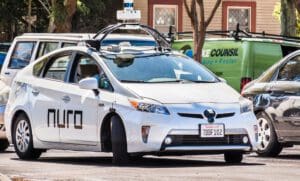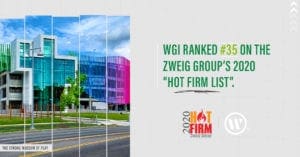
Is Your Community Ready For The Autonomous Vehicle Age?
If your city hasn’t begun planning for autonomous vehicles, it’s not too late — but the time for urgency is fast approaching.
Learn from award-winning professionals — explore our whitepapers, blogs, and the latest industry updates.
Join our dynamic organization of engineers, land surveyors, landscape architects, environmental scientists, and architects!
Talk to a market leader today! We’ll answer any questions you have about our professional services.

Frictionless parking technology has transformed college and university parking. The automation trend that began through the integration of Parking Access and Revenue Control Systems (PARCS) with other tools into frictionless parking suites provided a far more user-friendly experience, while making parking more manageable and cost-effective. This trend was already well underway before COVID arrived, and accelerated during the pandemic. For colleges and universities, the automation strategy they were already beginning to implement suddenly provided public health benefits by reducing face-to-face interactions between customers and staff. By the time the pandemic ran its course, many universities had fully automated their parking systems. However, although automation has become extremely common at college and university campuses across the United States and Canada, most aren’t fully realizing the potential benefits. Most campuses could be doing much more with their parking technology.
This process begins with license plate recognition (LPR) technology. Many schools have implemented LPR to help manage parking permits as part of gateless, frictionless parking systems. Most colleges and universities with gateless operations use mobile LPR for enforcement. When a parked vehicle’s license plate is scanned, the LPR recognizes the vehicle as belonging to a permitted parker. If a car without a permit enters the lot, the system flags the vehicle for enforcement action.
It’s a simple, effective system for managing permits. It’s cost-effective, too, because it doesn’t require on-site staff to manage entry and egress, and it minimizes the number of enforcement officers required to serve a parking lot or garage. By eliminating the need for physical hang tags or transponders to identify permit parkers, it can also save colleges and universities thousands of dollars spent to produce physical permits, replace them when they are inevitably lost or damaged, and manage the overall permit process.
However, LPR systems can provide much more value, and most colleges and universities aren’t leveraging that value. Most notably, LPR can provide occupancy data regarding who is using particular lots and garages, and when they are doing so. Mobile LPR can also provide information about how the spaces fill within a facility, remain occupied over time, and empty. When mobile LPR takes a scan, it provides geographic information system (GIS) coordinates to that scan. In short, the LPR can tell parking managers which parking facility a particular vehicle is using and what type of parker it is (resident student, commuting student, faculty, staff, or visitor). That information could be made available to parking managers in real-time so they can understand exactly how campus parking resources are being utilized at that particular moment.
The data can also be archived so parking planners can make more-informed decisions about how to manage campus parking assets. By analyzing utilization trends over specific periods, campus planners can understand how class schedules impact parking and modify class schedules in ways that put less stress on parking resources and reduce congestion on campus. Archival data can also help planners understand overall mobility trends, including who is driving, how many students and staff use micromobility, and how many visitors require parking. It can also help college administrators understand how many vehicles are essentially sedentary, used every few weeks by resident students, and how many drive to and from campus daily. This is all essential data for managing parking assets more effectively.
Effective management is more important than ever. There is more competition between colleges and universities today, and parking is a vital service and amenity that impacts students’ choices. Incoming students want to be able to bring their own vehicles to college, and colleges and universities with efficiently run parking systems that can accommodate all vehicles have a decided advantage as they recruit new students. One reason colleges and universities have been slow to access all the data capabilities of LPR is privacy concerns. Yes, certain states and localities prohibit the collection of license plate information. Even institutions that collect and use parking data often wipe it every 30 days to protect the privacy of people parking in campus lots and garages. Data security should be an elemental concern for everyone, and it’s particularly critical in an academic environment.
As important as privacy is, it can be easily managed. Parking data can be tokenized, and never needs to be individualized. So, rather than associating a vehicle’s permit with an individual, it can be tied to a parking type: resident student, commuting student, staff, or faculty. When the data is collected and analyzed, it won’t tell parking planners who parked, but rather what type of parker used the parking facility, and when. This is essential information for managing parking assets without compromising individual users.
Another way in which many colleges and universities aren’t getting enough out of their LPR is enforcement. Just as LPR can provide utilization data to parking managers, it can also provide data about payment compliance to enforcement officers. Campus enforcement personnel are much more effective—and efficient—when they have access to LPR enforcement data. There are two ways in which LPR can help with parking enforcement. The most obvious and direct is permit management. When fixed LPR cameras mounted at an entry record the passage of unpermitted vehicles, they can record the license plate information and transmit it, along with the parking location, to enforcement officers. Officers can then be dispatched to that parking lot or garage to ticket vehicles or leave warning notifications letting the parkers know where they are authorized to park when they visit in the future. This reduces the need for enforcement vehicles continually patrolling the parking facilities. Another common issue at colleges and universities is that they maintain separate camera systems for law enforcement and parking. For instance, some universities have security cameras to track repeat-offending vehicles or drivers on law enforcement watch lists.
Utilizing this hardware without communicating with the campus parking department makes no sense. Modern cameras are very versatile and can manage multiple functions at a time. When there are both law enforcement and parking cameras in a parking lot or garage, they should talk to each other. Colleges and universities should implement systems that utilize real-time data provided by LPR-equipped vehicles. It allows campus parking managers to know where their enforcement officers are at all times and see citations as they are written. The systems also let campus parking managers know which lots and garages are monitored and when. They can divert officers to facilities not yet checked, or whose checks are overdue. These multifunction systems are common in American cities and are well-suited to campus parking management. In truth, college and university campuses are essentially small cities, and a city enforcement model utilizing LPR-equipped vehicles can be the perfect solution for institutions of all sizes.
In the smart technology age, institutions need to treat these innovative technologies differently from the tools used in the past. First, it means ending the practice of departmental siloing. Departments sharing data paints a far more robust picture of what is actually happening on campus.
The people who use the data daily are those best positioned to understand what’s lacking in actionable data collection. Ideally, colleges and universities should hold regular data summits to examine the collected data, where it comes from, what’s connected, and how it’s communicated. This process can help universities get the most out of their technology. The institution’s parking consultant should be included in this process as the most qualified and independent arbiter who can offer the experiences of other universities that faced similar challenges.
The effectiveness of smart technologies is defined by how those technologies are applied, implemented, and utilized. While most colleges and universities have implemented one or more smart-parking technologies, many don’t use those tools to their maximum capabilities. A linked system collecting and integrating data from all technology located in parking facilities and formal strategic processes for managing that data are essential to getting the most out of your technology.
Let the campus parking experts at WGI show you how to create a campus parking technology program that will meet all your campus parking management needs and help you get more out of your existing parking technologies.
For more information about this study or to have a conversation with one of our experts, please contact us today.

WGI is a national design and professional services firm leading in technology-based solutions for the construction of public infrastructure and real estate development. At WGI, we’re providing Tomorrow’s Infrastructure Solutions Today.

If your city hasn’t begun planning for autonomous vehicles, it’s not too late — but the time for urgency is fast approaching.

Is your parking system “Smart”? Parking facilities are the first & last impression of customer service. Learn how to maximize efficiency & profitability of your operations when utilizing Smart Parking as you tailor the traveling experience for your customers and make sure that first & last impression is unforgettable.

Discover what scenario planning means for everyone involved in community design, infrastructure, and sustainable development.

WGI makes a very significant 41-spot jump from last year’s Hot Firm ranking of #76.

Selecting a qualified and experienced restoration consultant is vital to a project’s overall success. This expert case study details the steps to develop an effective rehabilitation program.

The future is fast approaching and 5G is here. Discover how you can fully leverage what 5G technology will ultimately unleash.
You’ve been searching for a place like WGI. We look forward to meeting you soon.
Sign up to receive emails to hear our latest news and achievements in our monthly newsletter.
Enter your zip code, and we’ll personalize your experience with local projects, office locations, team members, and more.
WGI supports its associates with meaningful opportunities for growth, strong benefits and perks, while we work collaboratively with clients and co-consultants to shape and improve communities.






WGI is a dynamic organization with opportunities nationwide for engineers, land surveyors, landscape architects, environmental scientists, and architects.